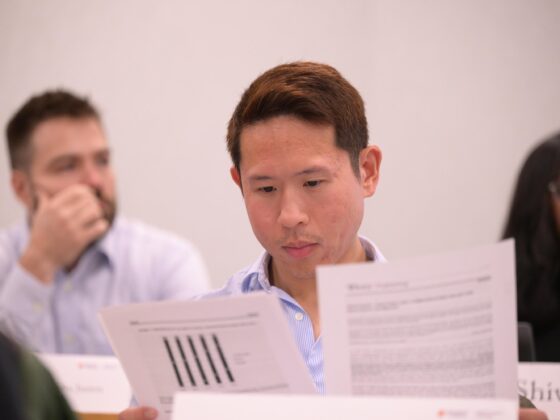The fresh perspective of a new year is a time when even the busiest among us take a moment to take stock of their careers — where they are, where they’d like to be and what will help them accelerate to the next level. For many, this will mean pursuing graduate-level education, for example, an MBA.
If this sounds like you, you have come to the right place. The Discover Darden blog has a wealth of resources for you to explore! The focus of this post is our Executive MBA Program, but for readers interested in our full-time MBA, we recommend checking out our full-time MBA website, Experience Darden podcast and our MBA Application Tips.
We are currently at the midpoint of our Executive MBA Admissions cycle, with a number of upcoming deadlines, so it’s truly a great time to be thinking about an MBA.
Here are a few quick and easy steps to help you evaluate whether business school may be right for you:
1.Schedule a conversation. Did you know that we offer one-on-one conversations with our Admissions Committee? We offer both phone and in-person conversations, and these informal chats are a great way to get the information you need as you explore the idea of pursuing an MBA.
Pro Tip: To make the most of your conversation, we generally recommend learning about the nuts and bolts of our program before the call. This will allow us to use the call time to learn more about you.
2. Listen to our podcasts. For many prospective students, simply hearing current students’ stories is often the thing that prompts them to apply.
The ExecMBA Podcast is our podcast about the Executive MBA experience at Darden. Not sure where to start? Check out our recent podcast retrospectives and be sure to add the podcast to your weekly download.
Pro Tip: A quick word about the power of stories. Here on the blog, we have a passion for debunking, and we often find that there is an awareness gap between the kinds of people prospective students expect to find in an MBA program and who is actually in MBA programs.
Many prospective students do not feel they have the “right” background for an MBA program, and it bears repeating that there is no “right” background for business school. Darden is a general management program, and we have students from a wide range of academic and professional paths in our classrooms.
The podcast is one way to get a feel for this diversity, but for our readers who prefer their podcasts with a side of data, consider the following.
In our current Executive MBA classes, roughly one-third of the students have a business-related undergraduate major. This means roughly two-thirds of our executive format students do not have a business-related academic background. In our Class of 2021, we actually have more History majors (13) than Finance majors (8).
Students range in years of work experience from five years to 25+ years. Our Classes of 2020 and 2021 also represent more than 100 employers and over 20 industries, respectively.
3. Join us for an event. One of the biggest challenges for prospective students is that all MBA websites pretty much emphasize the same things — incredible faculty, tight-knit community, strong career outcomes, supportive alumni networks, etc. In reality, the expression of these things looks and feels very different from school to school. So, what’s a prospective student to do?
Join us for an event (or several)! As an Admissions team, we enjoy getting to know prospective students, and we offer a broad range of events — coffee chats, networking dinners, webinars, class visits, etc. — to help you make a personal connection and develop a deeper understanding of our program.
While websites are helpful, they are no replacement for personal interaction, and, as many of our current students will tell you, personal interactions (events, phone calls, meetings, etc.) are the very thing that put Darden at the top of their lists.
One of the best things about researching MBA programs is all the interesting people you will meet along the way. Current students. Alumni. Admissions representatives. Other prospective students. Even if you ultimately elect not to pursue an MBA, you will have made a number of great contacts. Everybody wins!
As an Admissions team, we recommend an incremental approach. Find an event that looks interesting to you. Go check it out! After the event, ask yourself “Am I still interested in pursuing an MBA?” If the answer is “Yes,” consider joining us for another event. At some point, you will feel ready to submit an application, but remember, the application process is just another opportunity to evaluate your MBA plans.
4. Network. File under: “It takes a village.” No one makes this decision on their own, and networking plays an important role in all phases of the B-school search process.
If you’re thinking about an MBA, start with people in your personal and professional networks who have an MBA. Ask them about their MBA experience. What impact has the degree had on their careers? Would they do it again? What advice do they have for you as you think about this step?
Next, spend some time investigating target roles and companies (on LinkedIn, for example). Review the job descriptions and requirements. Do they say “MBA-required” or “MBA-preferred?” Check out the profiles of people in the kinds of roles that interest you. What is their background? Do they have an MBA? If so, from what school? This research can help provide some helpful market context to your more anecdotally oriented efforts.
And once you’ve decided to pursue an MBA, take some time to talk with the many stakeholders in your life – particularly those at work and at home. Share with them why you are interested in this degree, what programs you’re considering and what this may mean for your time and availability.
We recommend having these conversations before embarking upon the application process, as these individuals’ support will be critical to your program experience. In addition, talking to your boss about your desire to pursue an MBA now can also provide clarity regarding your progression at your current employer. If an MBA is an important personal goal for you but your employer is less than supportive of the idea, better to know this sooner rather than later, as it may ultimately influence both your pre- and post-MBA plans.
Now, a little light mythbusting.
Myth: All students in our Executive MBA Program are “climbers,” i.e. seeking to move up within their existing company.
Answer: False. We certainly have “climbers” in our Executive MBA classes, but you may be surprised to learn that over half of our executive format students identify as career switchers. We also have a significant number of entrepreneurial students seeking to launch their own businesses.
At Darden, all students have access to incredible career resources, including dedicated career advisors, career programming, job fairs, and on-Grounds and off-Grounds recruiting, among other opportunities.
Interested in learning more about how we support our executive format students’ career goals? On Episode 108 of the ExecMBA Podcast, we recently sat down with career advisors Jim Collins and Sarita Soldz, to talk about how to move from career uncertainty to job offer. More questions? Send us a message at ExecMBA@darden.virginia.edu. No question too small.
Check out faculty thought leadership published on Ideas to Action. And stay connected with us via social media: Facebook, Instagram, LinkedIn, Twitter, WeChat





